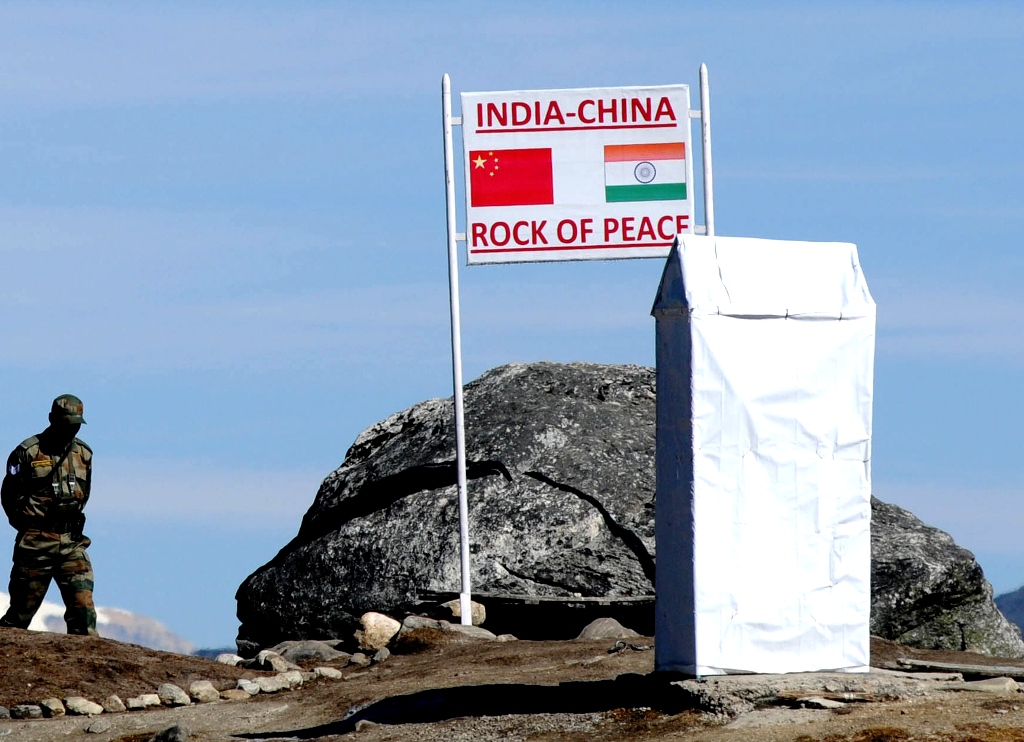
More than three weeks after Chinese troops were reported to have set up a camp far inside a region claimed by India, senior officers from both sides reached an agreement for a joint pullback at talks in the region.
"Both sides reached an agreement on Sunday night after a meeting was held between border commanders. We will withdraw our troops and China will do the same," a senior Indian army official told AFP on condition of anonymity.
"The withdrawal process has begun," another senior army official added.
A source in the foreign ministry also confirmed that the pullback had begun and said a statement would be made before parliament later in the day.
News of the withdrawal came after Indian Foreign Minister Salman Khurshid had hinted that he could cancel a planned trip to Beijing from Wednesday if there was no resolution to the dispute.
The spat had also cast a cloud over the build-up to a planned visit to New Delhi by new Chinese Premier Li Keqiang later this month.
Khurshid said last month that it was important to avoid "destroying" years of progress made between the pair while India's Prime Minister Manmohan Singh had also stressed his desire to avoid exacerbating tensions.
Relations between the neighbours have improved in recent years but they are still dogged by mutual suspicion – the legacy of a 1962 border war.
The informal border separating China and India is known as the Line of Actual Control (LAC). While it has never been formally demarcated, the countries have signed two accords to maintain peace in frontier areas.
Small incursions of a few kilometres across the contested boundary are common but it is rare for either country to set up camps in disputed territory.
Both countries have been seeking to keep the dispute low-key, keen not to disrupt their booming bilateral trade.
India has called the incursion a "localised problem" and says it believes it is possible to resolve the problem peacefully.
Beijing has said both countries had the "capacity and wisdom" to defuse the row through "friendly consultation" but insist their troops have "not trespassed the line".
COMMENTS (21)
Comments are moderated and generally will be posted if they are on-topic and not abusive.
For more information, please see our Comments FAQ





1732354127-0/Untitled-design-(3)1732354127-0-270x192.webp)


1732344836-0/BeFunk_§_]__-(37)1732344836-0.jpg)








India, its history tells us is more interested in its national interest than in the right or wrong of a cause. She supported all actions, policies of the Soviet, Union until its breakup in 1990. For instance it did not join the world community in 1956 in condemning Soviet forces marched into Hungry. Neither it found any thing wrong when Soviets in 1979 marched into Afghanistan, She changed her policies positively towards the US since 1990 when US became the sole global superpower.So softy, softy peaceful approach to problems with China is no surprise. Saeed
@Aschraful Makhlooq: Or Perhaps China does not wish to push India into the laps of NATO orbit. Also there's an ever growing trade & investment b/w the two. Then we have Nicobar Islands overlooking the narrow Malacca strait through which most of China's international trade flows. China would prefer a smooth traffic in that zone.Also China would not like Indian Govt to officially recognise & aid radicalisation of as yet Peaceful Tibetan Govt in exile (self immolation is by no means a violent rebellion). In brief, Smaller India still has lots of levers to keep bigger China benevolent.
Now Contrast this with smaller Pakistan's levers inside bigger India - Absolutely Zilch (little or no trade link, no transit allowed to Indian goods towards Central Asia, all kind of International alliances tried & tested, gun totting zealots still in active mode). In effect, Pakistan gives India ZERO reason to be benevolent.
This is only Chinese government's benevolence on Indian government because Chinese are peaceful nation and people and they don't want to waste their precious money on the useless and trivial matters with India on war's and border's related matters because Chinese government's and nation's main objectives are to spend money to boost up,revamp and strengthen Chinese economy instead of wasting money on war and collecting weapons....
@Yasin: China starts but doesn’t finish the job. Like they didn’t in 1962. China should take over whole of India and give us Kashmir,Delhi,Hyderabad,Punjab,Junagad etc. etc. There will be permanent peace in the region.
So you think China should attack the 3rd largest economy in Asia who have the 2nd largest army complete with nuclear tipped ICBMs thereby sabotaging the billion dollar trade they're currently engaging so that they can gift the occupied land to a country who is among the top 10 failed states and is living on foreign aid with no chance of any revival and mostly importantly has no economic significance to China
If wishes were horses,Pakistanis would be riding them
@Yasin
The Chinese have bigger Army and more resources for War. The one thing they do not have is War experience which the Indian Army has from the two world war and 1971. The Indian army was defeated in 1962 because Nehru had said "India does not need an Army she needs engineers" since then things have changed. Sikkim joined India only for fear of Chinese occupation. In Arunachal Pradesh both India a China has signed a treaty not to violate each other's territories after 1987 stand off. China can push around in South China sea but across the Himalayas a bit too much for them. and Also Tibetans will cause trouble for them.
@Yasin: If Pakistan is destroyed then there will be peace in entire world.
@Yasin: "China starts but doesn’t finish the job. Like they didn’t in 1962. China should take over whole of India and give us Kashmir,Delhi,Hyderabad,Punjab,Junagad etc. etc. There will be permanent peace in the region"
In 1962, India was unprepared. But unlike Pakistan in 1965, India did not lie to its people and claim victory. It found out gaps in its defense preparedness and addressed them. It has not lost a war since then.
China tried the same tricks twice in the 60s bolstered by its success in 1962 and was caught off-guard by swift response by India after which peace has reined on that border. Please check Chola incident and Nathu La incident.
As for as China capturing Junagad and Hyderabad...lol neither is China so foolish, nor India so weak. Both are responsible nuclear powers who do not need to mention that they are an 'atomy taaqat' in every second sentence.
@Yasin: Thanks for your wishful thinking China knows what will happen after the Bangladesh experience of what will happen to it.It is not foolish to attempt heroics.It is fully aware that it has to tackle a changed India.It may end up loosing tibet and why would it want that to happen.
@INDIAN SHIA: Indeed, Infact I would give an equal(or perhaps more) credit to Mr. Khurshid's diplomatic skills, he quickly arranged a visit to China and then (through a very careful choice of words) made it conditional upon resolution of the present standoff - stroke of a genius.
@suhaib: As a rule, none of the Side sets up tents in the region where the claims overlap (though both sides do patrol upto their claims). Here the Chinese first set up their tents in the disputed sector, so our soldiers also followed in their footstep by setting up some tents right in front of Chinese tents. Now in order to disengage, both sides have to pack up their tents. Chinese wanted Indian side to pack up first but later it was agreed that both sides would pack up simultaneously.
@Yasin: "China starts but doesn’t finish the job. Like they didn’t in 1962. China should take over whole of India and give us Kashmir,Delhi,Hyderabad,Punjab,Junagad etc. etc. There will be permanent peace in the region." Why are you asking the Chinese when your own dear Kaptaan can do it in 90 days, because thats the time he says he will take to finish any job:) To my fellow Indians..talking about diplomacy with our western neighbours is sheer waste of time. let them live in the paradise they think they are in :)
The focus for both countries is on the economy and i commend the Chinese for not escalating the situation.
and why 'indian army is pulling back' chinese incrused in india, didn't they?
@INDIAN SHIA. INDIAN PM knows how to deal. Gandhi techniques with China and Kargil Techniques with Pakistan
Looks like Pakistan is losing her dear friend china.
@Yasin: "China starts but doesn’t finish the job. Like they didn’t in 1962. China should take over whole of India and give us Kashmir,Delhi,Hyderabad,Punjab,Junagad etc. etc. There will be permanent peace in the region." Why ask Chinese. If you people have guts, take them. Perhaps you do not know the details of latest incident. It was Indian Army, which had moved there and had the camp in their sights (300m) that did the trick. You tried in Kargil. Chinese are smart. They know all the foreign investment would vanish in a jiffy had the conflict escalated. Now they had weighed their option and acted sensibily. Hope youpeople learn a lesson or two from your "Higher than mountains - deeper than sea" friends.
China starts but doesn't finish the job. Like they didn't in 1962. China should take over whole of India and give us Kashmir,Delhi,Hyderabad,Punjab,Junagad etc. etc. There will be permanent peace in the region.
@Stranger: INDIAN PM proves GANDHI techniqe works :-)
@Stranger Its clear he is praising, Diplomacy works (not with Pak)
@INDIAN SHIA: I dont understand what are u trying to say . Are u praising or censuring the Indian PM ?
INDIAN PM done it. :-)